Questões de Língua Inglesa do ano 2008
Lista completa de Questões de Língua Inglesa do ano 2008 para resolução totalmente grátis. Selecione os assuntos no filtro de questões e comece a resolver exercícios.
Língua Inglesa - Interpretação de Texto - Centro de Seleção e de Promoção de Eventos UnB (CESPE) - 2008
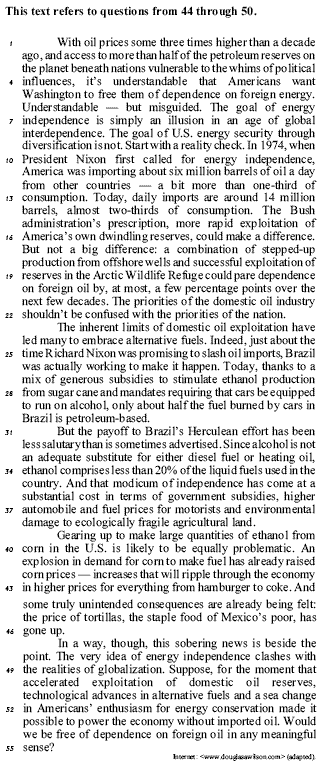
Based on the text, it can be said that
- A.
America today imports more than three times as much the amount of oil it used to by the mid seventies.
- B.
currently, the U.S. imports two-thirds of its consumption everyday.
- C.
the Bush administration officially determined a slower exploitation of America's own oil reserves.
- D.
ethanol from corn will reduce external dependence of the U.S. on foreign oil during the decades to come.
- E.
the priorities of the nation may be mixed up with the priorities of the domestic oil industry.
Língua Inglesa - Interpretação de Texto - Centro de Seleção e de Promoção de Eventos UnB (CESPE) - 2008
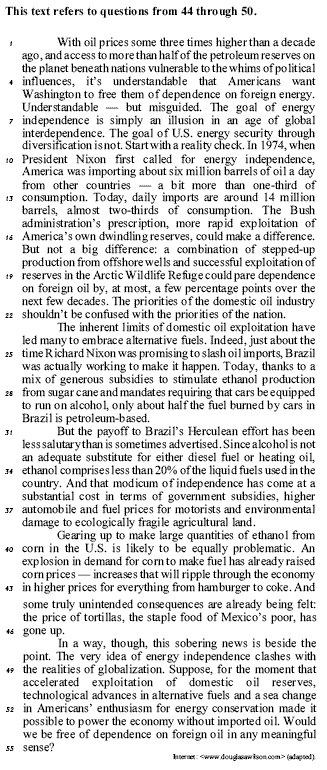
According to the text, it can be said that
I alternative fuels will be a substitute for petroleum.
II Brazil was already doing what Nixon was pledging.
III Brazil succeeded in reducing its petroleum based fuel consumption by cars by around 50%.
IV Brazilian tremendous effort to produce ethanol is as salutary as it is announced.
V alcohol is neither suitable to replace diesel fuel nor heating oil.
The total number of true items is
- A.
1.
- B.
2.
- C.
3.
- D.
4.
- E.
5.
Língua Inglesa - Interpretação de Texto - Centro de Seleção e de Promoção de Eventos UnB (CESPE) - 2008
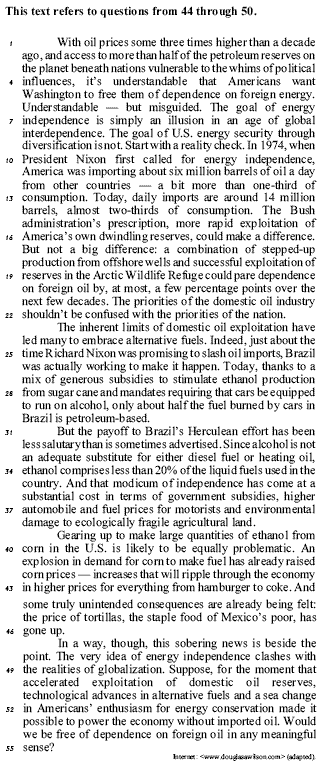
Based on the text, choose the correct option.
- A.
About 80% of the liquid fuels used in Brazil come from ethanol.
- B.
No disadvantages can be found in the use of ethanol when compared with the use of petroleum.
- C.
The use of great quantities of ethanol may also be harmful.
- D.
Corn prices will become lower once the demand for it increases.
- E.
There is no relation whatsoever between the price of corn and that of hamburgers.
Língua Inglesa - Interpretação de Texto - Centro de Seleção e de Promoção de Eventos UnB (CESPE) - 2008
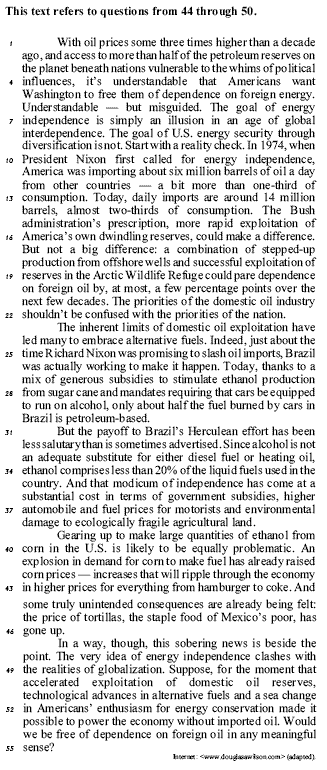
According to the text, it can be concluded that
- A.
the American serious worry about becoming independent of foreign oil is pointless, in a way.
- B.
energy independence and globalization are not related issues.
- C.
the fast exploitation of domestic oil will make it possible for the USA to get rid of foreign imports.
- D.
American's will is all that is required to overcome the difficulties in importing oil.
- E.
the USA is able to get free from foreign oil.
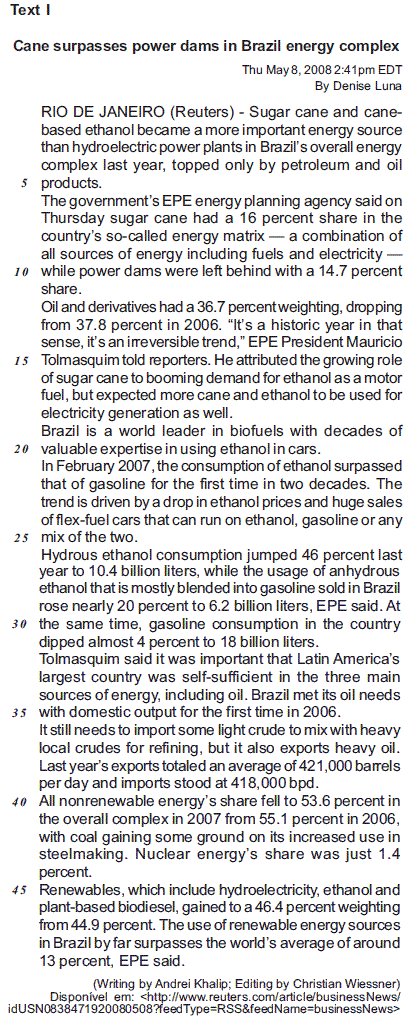
The main purpose of Text I is to
- A.
criticize the increasing price of ethanol and flex fuel cars.
- B.
condemn the excessive use of renewable energy sources in Brazil.
- C.
announce a recent and relevant change in Brazils energy complex.
- D.
report on the excessive use of cane and ethanol for electricity generation in Brazil.
- E.
explain why gasoline consumption has suddenly dropped in Latin American countries.
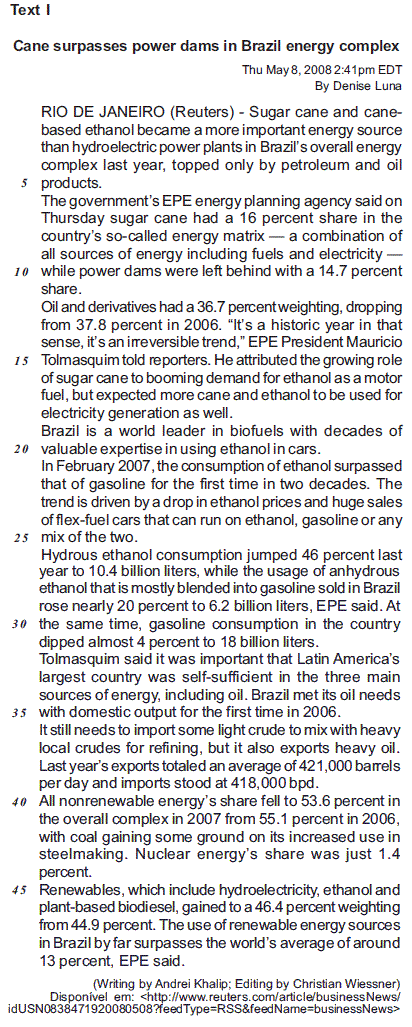
Based on Paragraph 1, it is correct to say that
- A.
petroleum and oil products are the most significant energy sources in Brazil, followed by sugar-cane ethanol and hydroelectric power.
- B.
petroleum and oil products must be the top priority of the Brazilian government.
- C.
ethanol derived from sugar-cane has surpassed all other forms of power generation in Brazil.
- D.
hydroelectric plants have always been the most efficient source of energy in Brazil.
- E.
hydroelectric plants and cane-based ethanol are, nowadays, the most productive sources of energy in Brazil.
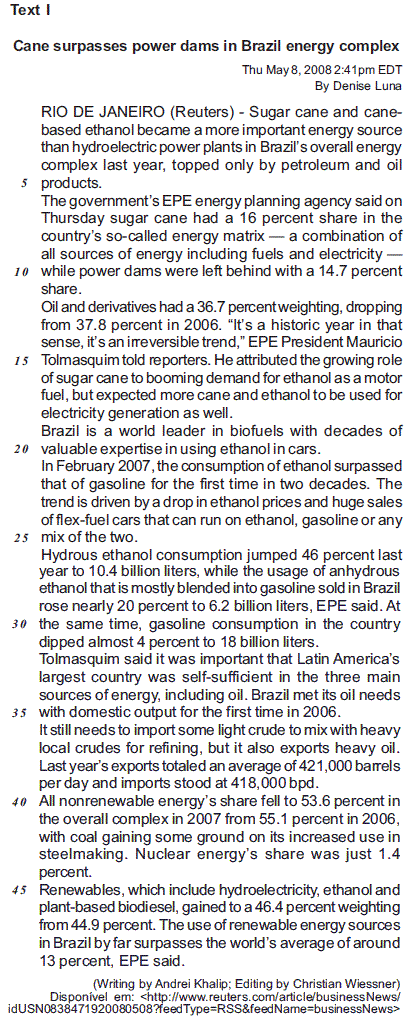
According to EPE President, Mauricio Tomalsquim,
- A.
oil and derivatives will always remain the only energy source to be used in motors.
- B.
sugar-cane based ethanol is efficient as fuel for cars, but cannot be used to generate electricity.
- C.
the consumption of ethanol is expected to drop in the future 2006 was a historical exception in energy demands.
- D.
the production of oil has boomed after 2006, as a result of the historical tendency for the manufacture of exclusive petroleum-driven motors.
- E.
it was important that Brazil be able to supply all its needs in generating energy, with renewable fuels like ethanol, hydroelectric power and petroleum.
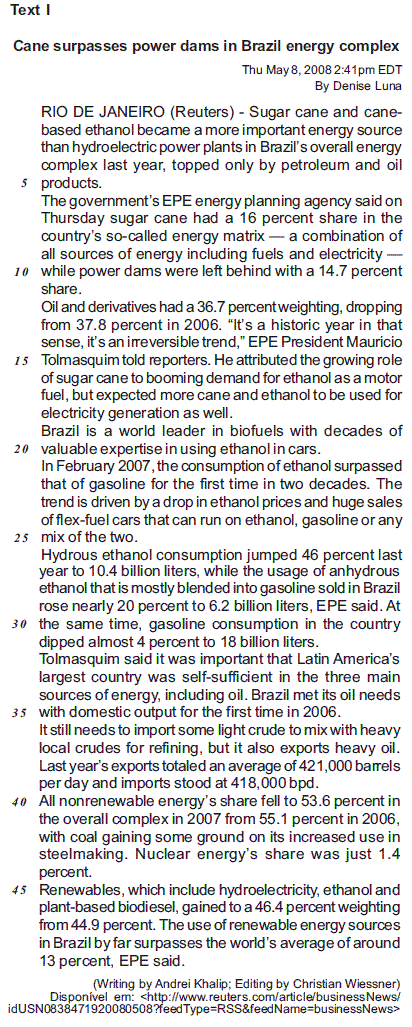
All the boldfaced items refer to Brazil, EXCEPT
- A.
gasoline consumption in the country dipped almost 4 percent to 18 billion liters. (lines 30-31)
- B.
Tolmasquim said it was important that Latin Americas largest country was self-sufficient in the three main sources of energy, (lines 32-34)
- C.
Brazil met its oil needs with domestic output for the first time in 2006. (lines 34-35)
- D.
It still needs to import some light crude to mix with heavy local crudes (lines 36-37)
- E.
but it also exports heavy oil. (line 37)
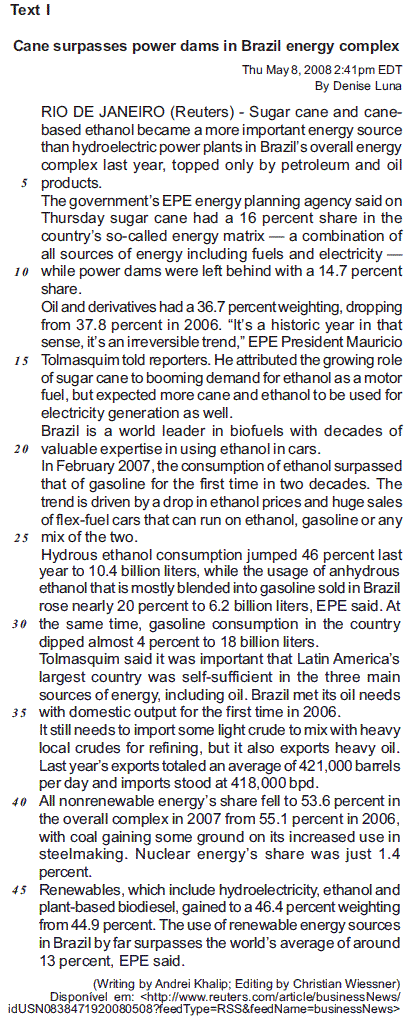
In terms of reference, it is correct to affirm that
- A.
14.7 percent share (lines 10-11) refers to the energy generated by biofuels and hydro-energy.
- B.
10.4 billion liters (line 27) - refers to the consumption of hydrous ethanol in 2006.
- C.
4 percent (line 31) refers to the increase in gasoline consumption in 2007.
- D.
418,000 bpd (line 39) refers to amount of barrels of gasoline produced per day in Brazil.
- E.
44.9 percent (line 47) refers to the percentage that renewable energy sources represented in 2006.
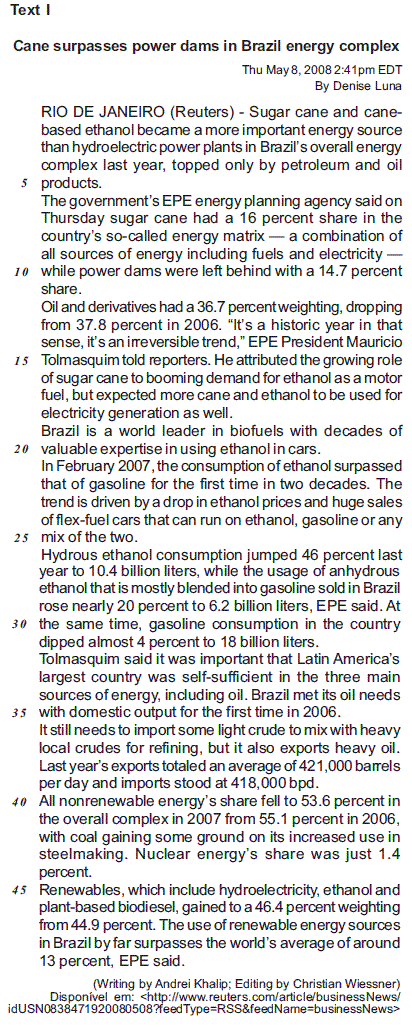
The fragment The use of renewable energy sources in Brazil by far surpasses the worlds average of around 13 percent, (lines 47-49) means that Brazil
- A.
uses much more renewable energy than other countries in the world.
- B.
uses just 13 percent of the renewable energy sources produced around the world.
- C.
still has to go a long way to reach the global levels of renewable energy use.
- D.
does not consume as much ethanol and plant-based biodiesel as other nations.
- E.
cannot compete with the international production of ecofriendly fuels.


